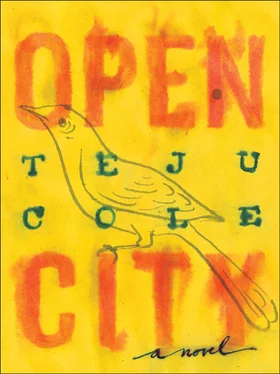By fifty, which is what I estimated her age to be, a woman’s appearance often requires effort. For someone the age of the waitress, someone in her twenties, to be even a little good looking was enough. At that age, everything else falls into accord: skin is taut, stature straight, gait sure, hair healthy, voice clear and unwavering. By fifty, there is a struggle. And for these reasons, the afternoon was a surprise — a surprise for the tourist, at the clearly expressed, if largely wordless, interest she began to pick up from me, and surprise for me, too, at her large gray-green eyes, their sad intelligence, their intense and entirely unanticipated sexual allure. The afternoon had taken on the character of a dream, a dream that now extended to her hand touching my back lightly, for a moment, as I moved the umbrella so that it covered her fully. We stood there for a moment and watched the rain continue to come down in sheets. Then we walked together a little way along the little cobblestone streets, up the busy rue de la Régence, hardly speaking, using the shared umbrella as a pretext as far as we could take it. But when she suggested a drink at her hotel, the ambiguous touch on the back had given way to clarity, and my resolve became correspondingly strong. I would take the folly, I said to myself, as my heart raced, just as far as she was willing to go with it. And clarity gave us both courage. I followed her up, my eyes set on the hemline of her gray skirt, which was guillotined at the calf.
In the faux Louis XV bedroom, her shyness dissolved. She embraced me, and the embrace became a kiss on the cheek. I kissed her neck — long, a surprise — and her forehead, topped by that mane of hers, which had become mostly gray again in interior light, then, finally, her mouth. Her waist was thick, pliant; she went down on her knees, quickly, and sighed. I pulled her back up, shaking my head. Then we both went down together, by the side of the Baroque bed, both pushed up against its satin shams, and I pulled the linen skirt upward to her waist.
Afterward, she told me her name — Marta? Esther? I forgot it immediately — and explained, with some difficulty, that she handled the travel bookings for the Constitutional Court in Brno. She had a grown daughter who was a ski instructor in Switzerland. She said nothing about a husband, and I didn’t ask. I introduced myself as Jeff, an accountant from New York; the unimaginative falsehood felt seedy, but it also had a comedy that I appreciated, and was resigned to appreciating alone. Then we drew back the sheets on the unrumpled bed, and slept. By the time we woke up, two or three hours later, night had fallen. Wordlessly, I got dressed, but this time the silence was wreathed with smiles. I kissed her on the neck again, and left.
The lights in the park had come on, and the rain had stopped. People were out in pairs, in families, heading to performances or to restaurants. I felt light and grateful. Rarely had I seen Brussels looking so generous. A wind rustled the leaves, and I wondered if I would remember her face; it was unlikely that I would. But she had made the whole thing easy for me, my first since Nadège, and something needful that I’d neglected to do. Now it was done, and I couldn’t have wished it different. Best of all, I decided, had been her pleasure; we were simply two people far away from home, doing what two people wanted to do. To my lightness and gratitude was added a faint sorrow. It was a few miles back to Etterbeek, and walking there, I returned to my solitude. This cannot happen again, I had wanted to say to her; but I found that it was not quite what I meant to say, and that nothing really needed saying. I returned to the apartment, and the following day I didn’t go out. I remained in bed and read Barthes’s Camera Lucida . Later in the afternoon, Mayken came round, and I gave her money.
The following evening, or the one after that, I found the scrap of paper on which Dr. Maillotte had written her phone number, and this spurred me to go to the phone shop. Farouq wasn’t there. The older fellow, solemn, with sallow skin, was working at the desk. He had a brush mustache and bulbous eyes. I nodded to him, and went into a phone booth. A man answered the phone on the other end, but when I spoke in English, he called Dr. Maillotte.
She came to the phone and said, Hello, who is this? Oh, yes, how are you, but I am sorry, tell me how we know each other again. I reminded her. Ah, yes, of course. You are in Belgium for a month, three weeks? When do you leave? Ah, so soon. I see. Well, why don’t you call me on Monday, and we can go out for dinner or something, before you leave the country.
When I replaced the handset, and went out to pay, Farouq had arrived and the solemn man was chatting with him. Farouq saw me. My friend, he said, how are you? He insisted that I not pay for the call, which in any case had been brief and local. The colleague went away, and a customer came in. Farouq greeted her, Ça va? Alhamdulillah , the woman replied. Farouq turned to me and said, It’s very busy, as you can see. Not only for all the people making New Year greetings but also for a lot of people calling home for the Eid. He gestured to the computer monitor behind him, and on it was a log of the calls ongoing in all twelve booths: Colombia, Egypt, Senegal, Brazil, France, Germany. It looked like fiction, that such a small group of people really could be making calls to such a wide spectrum of places. It’s been like this for the past two days, Farouq said, and this is one of the things I enjoy about working here. It’s a test case of what I believe; people can live together but still keep their own values intact. Seeing this crowd of individuals from different places, it appeals to the human side of me, and the intellectual side of me.
I used to work as a janitor, he said, at an American school in Brussels. It was the foreign campus of a university in the States, and for them I was just the janitor, you see, the man who cleaned the classrooms when their classes were finished. And I was nice, quiet, like a janitor should be; I pretended not to have any ideas of my own. But one day, I was cleaning one of the offices, and the principal of the school, the head of academics, came around, and somehow we got talking, and I just had this idea to really speak as myself, not as a janitor, but as someone with ideas. So I started talking, and I used a bit of my jargon. I was talking about Gilles Deleuze and, of course, he was surprised. But he was open, and I went on, and we discussed Deleuze’s concept of waves and dunes, about how it is the spaces between those forms, the necessary spaces, that gives them their definitions as waves or dunes. The principal was completely responsive to this conversation, and in this generous American way, he said, Come to my office sometime and we’ll talk more.
When Farouq said this, I imagined the man’s tone of voice. It was like an arm around the shoulder, a disarming gesture, a promise of complicity: Come to my office sometime, let us engage with each other. But, Farouq said, continuing his story, when I saw him next, he not only refused to speak to me but actually pretended he had never seen me before. I was just the janitor, mopping the floor, nothing more than a part of the furniture. I greeted him, tried for a moment to remind him of our Deleuze conversation, but he said nothing. There was a line, and I was wasting my time in the attempt to cross it. As Farouq spoke, people went in and out of the booths rapidly, and he greeted each person, the level of familiarity determined, I guessed, by how often they’d come into the shop before. He spoke French, Arabic, English, as was appropriate; with the man who had been calling Colombia, he exchanged a few words of Spanish. His judgment of the right language to use with each person was swift, and his manner so friendly that I wondered why I had had the impression, when I first met him, that he was distant.
Читать дальше












